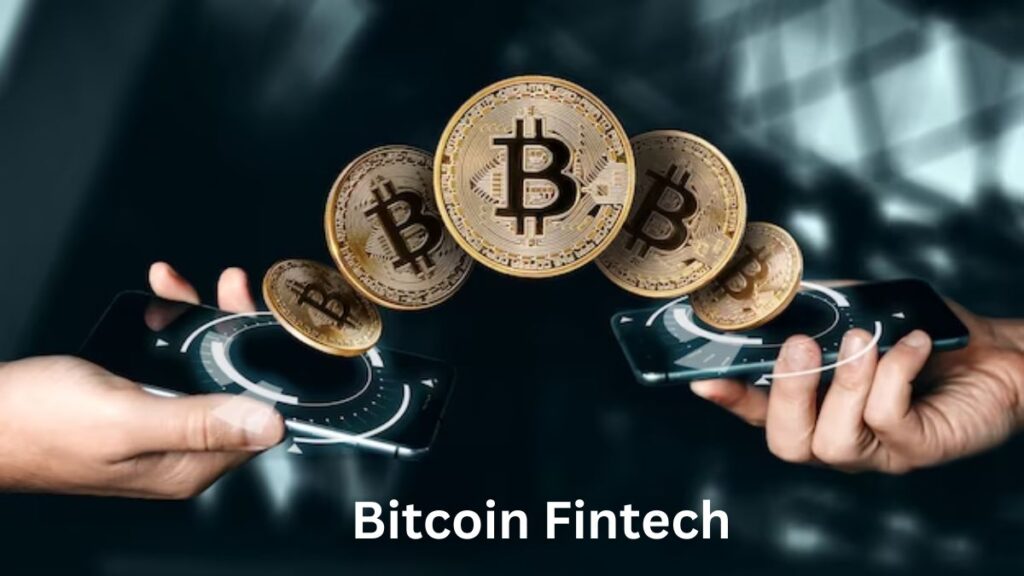Bitcoin and Fintech have revolutionized the financial industry by disrupting traditional financial systems and introducing decentralized digital currencies. Bitcoin, a decentralized cryptocurrency, operates on a blockchain, ensuring immutability and transparency. Its scarcity and halving process make it a hedge against inflation. Fintech, on the other hand, involves the use of technology to provide financial services, such as mobile banking, digital payments, robo-advisors, and blockchain technology. The combination of these technologies has led to the development of decentralized finance (DeFi), enabling global access to financial services without centralized intermediaries. However, the integration of these technologies presents challenges such as regulatory uncertainty, security, privacy, and potential illicit use. As Bitcoin and Fintech continue to evolve, their integration is expected to redefine the financial landscape, driving financial inclusion, efficiency, and innovative solutions.
Understanding Bitcoin
Bitcoin, often referred to as digital gold, is a decentralized cryptocurrency that operates on a blockchain. Created in 2009 by an anonymous entity known as Satoshi Nakamoto, Bitcoin utilizes a peer-to-peer network to facilitate secure and transparent transactions. Its underlying technology, blockchain, ensures immutability and transparency, making it resistant to fraud and manipulation.
A. Decentralization and Security
One of Bitcoin’s key features is its decentralized nature. Unlike traditional currencies that are controlled by governments and central banks, Bitcoin operates on a peer-to-peer network, eliminating the need for intermediaries. This decentralization enhances security, as there is no single point of failure susceptible to hacking or manipulation.
B. Limited Supply and Halving
Bitcoin’s scarcity is another critical aspect contributing to its value. With a capped supply of 21 million coins, Bitcoin’s scarcity is akin to precious metals like gold. Additionally, the process of “halving” occurs approximately every four years, reducing the rate at which new bitcoins are created. This scarcity model has led to Bitcoin being perceived as a hedge against inflation, attracting investors seeking a store of value.
Fintech and Its Evolution
Financial technology, or Fintech, refers to the innovative use of technology to provide financial services. Fintech encompasses a wide range of applications, including mobile banking, digital payments, robo-advisors, and blockchain technology. The integration of Fintech has streamlined processes, enhanced accessibility, and democratized financial services.
A. Mobile Banking and Digital Payments
The advent of mobile banking applications has transformed the way individuals manage their finances. Users can access their accounts, transfer funds, and make payments seamlessly through their smartphones. Digital payment solutions, such as mobile wallets and contactless payments, have gained popularity, offering convenience and efficiency in day-to-day transactions.
B. Robo-Advisors and Automated Investing
Robo-advisors leverage algorithms and artificial intelligence to provide automated, low-cost investment advisory services. These platforms analyze user preferences, risk tolerance, and financial goals to create diversified investment portfolios. By automating investment decisions, robo-advisors democratize wealth management, making investment services more accessible to a broader audience.
C. Blockchain and Smart Contracts
Blockchain technology, the backbone of Bitcoin, has found applications beyond cryptocurrencies. Smart contracts, self-executing contracts with the terms directly written into code, enable automated and trustless transactions. Fintech companies are increasingly exploring the potential of blockchain and smart contracts to streamline processes such as supply chain management, insurance, and real estate transactions.
Bitcoin and Fintech Synergy
A. Cross-Border Transactions
Bitcoin enables near-instantaneous, cost-effective cross-border transactions, providing a viable alternative for individuals and businesses seeking efficient global payment solutions. Crypto cards can further enhance this convenience by allowing users to spend their Bitcoin holdings directly at merchants, bridging the gap between cryptocurrency and everyday purchases.
B. Financial Inclusion
Fintech, coupled with Bitcoin, has the potential to enhance financial inclusion by reaching underserved populations. In regions with limited access to traditional banking infrastructure, mobile banking and digital payment solutions powered by Bitcoin can empower individuals to participate in the global economy, fostering economic growth and reducing poverty.
C. Decentralized Finance (DeFi)
The marriage of Bitcoin and Fintech has given rise to the concept of decentralized finance (DeFi). DeFi leverages blockchain technology to recreate and enhance traditional financial services without the need for centralized intermediaries. Through decentralized lending, borrowing, and trading platforms, users can access financial services globally, bypassing traditional banking systems.
Challenges and Regulatory Landscape
While the integration of Bitcoin and Fintech holds immense potential, it also presents challenges and concerns. Regulatory frameworks vary globally, and governments are grappling with how to regulate and incorporate these technologies. Issues such as security, privacy, and potential illicit use have prompted regulators to carefully consider the implications of widespread adoption.
A. Regulatory Uncertainty
The regulatory landscape surrounding Bitcoin and Fintech is evolving rapidly. Some countries have embraced these technologies, providing a conducive environment for innovation, while others have expressed concerns about their impact on traditional financial systems. Striking a balance between fostering innovation and ensuring consumer protection remains a significant challenge for policymakers.
B. Security and Privacy
The decentralized nature of Bitcoin provides security benefits, but concerns persist regarding the anonymity associated with cryptocurrency transactions. Fintech platforms must prioritize robust security measures to protect user data and prevent unauthorized access. Striking the right balance between privacy and regulatory compliance is crucial for the long-term success of these technologies.
The Future Landscape
As Bitcoin and Fintech continue to evolve, their integration is likely to redefine the financial landscape. The synergy between these technologies has the potential to drive financial inclusion, improve efficiency, and create innovative solutions to longstanding challenges. However, addressing regulatory concerns and ensuring responsible innovation will be crucial to realizing the full benefits of this transformative partnership.
Conclusion
In the span of a decade, Bitcoin and Fintech have disrupted traditional financial models, paving the way for a more inclusive, efficient, and decentralized financial system. The ongoing evolution of these technologies holds the promise of reshaping how individuals and businesses interact with money, investments, and financial services. As we celebrate the one-year anniversary of this article, the journey of Bitcoin and Fintech continues, inviting us to witness and participate in the unfolding revolution in finance.







